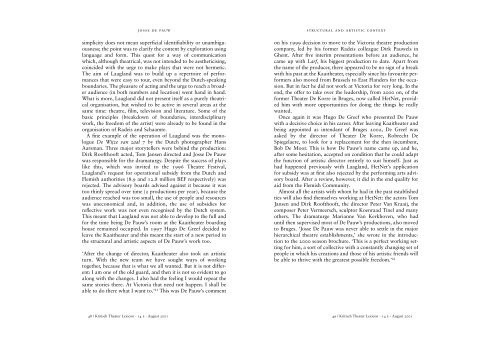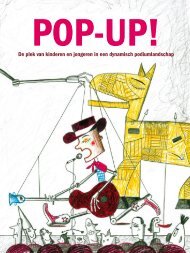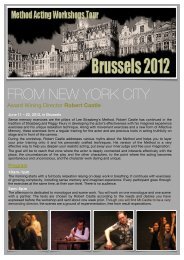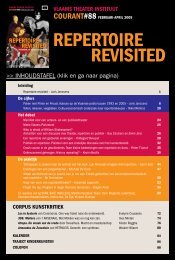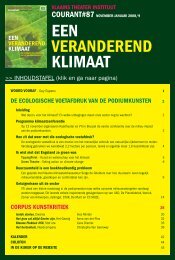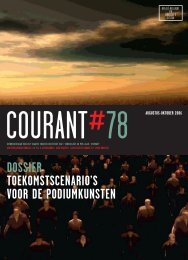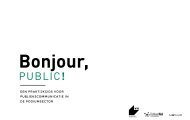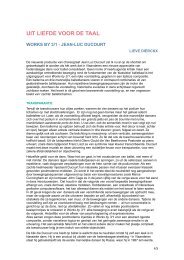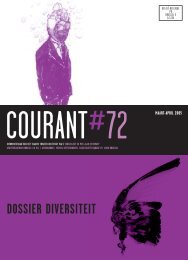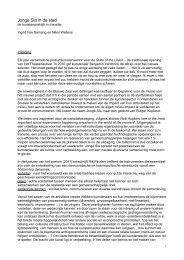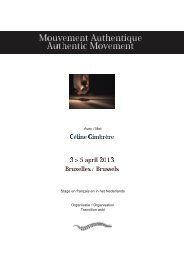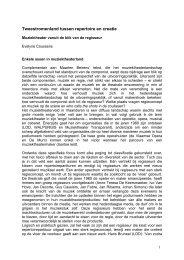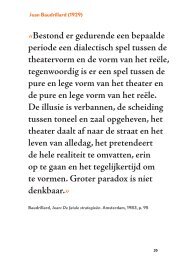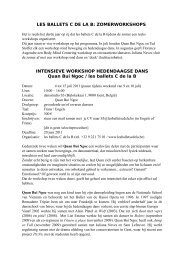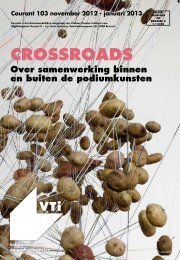You also want an ePaper? Increase the reach of your titles
YUMPU automatically turns print PDFs into web optimized ePapers that Google loves.
josse de pauw<br />
simplicity does not mean superficial identifiability or unambiguousness;<br />
the point was to clarify the content by exploration using<br />
language and form. This quest for a way of communication<br />
which, although theatrical, was not intended to be aest<strong>het</strong>icising,<br />
coincided with the urge to make plays that were not hermetic.<br />
The aim of Laagland was to build up a repertoire of performances<br />
that were easy to tour, even beyond the Dutch-speaking<br />
boundaries. The pleasure of acting and the urge to reach a broader<br />
audience (in both numbers and location) went hand in hand.<br />
What is more, Laagland did not present itself as a purely theatrical<br />
organisation, but wished to be active in several areas at the<br />
same time: theatre, film, television and literature. Some of the<br />
basic principles (breakdown of boundaries, interdisciplinary<br />
work, the freedom of the artist) were already to be found in the<br />
organisation of Radeis and Schaamte.<br />
A fine example of the operation of Laagland was the monologue<br />
<strong>De</strong> Wijze van zaal 7 by the Dutch photographer Hans<br />
Aarsman. Three major storytellers were behind the production:<br />
Dirk Roofthooft acted, Tom Jansen directed and Josse <strong>De</strong> <strong>Pauw</strong><br />
was responsible for the dramaturgy. <strong>De</strong>spite the success of plays<br />
like this, which was invited to the 1996 Theatre Festival,<br />
Laagland’s request for operational subsidy from the Dutch and<br />
Flemish authorities (8.9 and 12.8 million BEF respectively) was<br />
rejected. The advisory boards advised against it because it was<br />
too thinly spread over time (2 productions per year), because the<br />
audience reached was too small, the use of people and resources<br />
was uneconomical and, in addition, the use of subsidies for<br />
reflective work was not even recognised by the Dutch system.<br />
This meant that Laagland was not able to develop to the full and<br />
for the time being <strong>De</strong> <strong>Pauw</strong>’s room at the Kaaitheater boarding<br />
house remained occupied. In 1997 Hugo <strong>De</strong> Greef decided to<br />
leave the Kaaitheater and this meant the start of a new period in<br />
the structural and artistic aspects of <strong>De</strong> <strong>Pauw</strong>’s work too.<br />
‘After the change of director, Kaaitheater also took an artistic<br />
turn. With the new team we have sought ways of working<br />
together, because that is what we all wanted. But it is not different:<br />
I am one of the old guard, and then it is not so evident to go<br />
along with the changes. I also had the feeling I would repeat the<br />
same stories there. At Victoria that need not happen. I shall be<br />
able to do there what I want to.’ 21 This was <strong>De</strong> <strong>Pauw</strong>’s comment<br />
48 / Kritisch Theater Lexicon - 14 e - August 2001<br />
structural and artistic context<br />
on his 1999 decision to move to the Victoria theatre production<br />
company, led by his former Radeis colleague Dirk <strong>Pauw</strong>els in<br />
Ghent. After five interim presentations before an audience, he<br />
came up with Larf, his biggest production to date. Apart from<br />
the name of the producer, there appeared to be no sign of a break<br />
with his past at the Kaaitheater, especially since his favourite performers<br />
also moved from Brussels to East Flanders for the occasion.<br />
But in fact he did not work at Victoria for very long. In the<br />
end, the offer to take over the leadership, from 2000 on, of the<br />
former Theater <strong>De</strong> Korre in Bruges, now called HetNet, provided<br />
him with more opportunities for doing the things he really<br />
wanted.<br />
Once again it was Hugo <strong>De</strong> Greef who presented <strong>De</strong> <strong>Pauw</strong><br />
with a decisive choice in his career. After leaving Kaaitheater and<br />
being appointed as intendant of Bruges 2002, <strong>De</strong> Greef was<br />
asked by the director of Theater <strong>De</strong> Korre, Robrecht <strong>De</strong><br />
Spiegelaere, to look for a replacement for the then incumbent,<br />
Bob <strong>De</strong> Moor. This is how <strong>De</strong> <strong>Pauw</strong>’s name came up, and he,<br />
after some hesitation, accepted on condition that he could adapt<br />
the function of artistic director entirely to suit himself. Just as<br />
had happened previously with Laagland, HetNet’s application<br />
for subsidy was at first also rejected by the performing arts advisory<br />
board. After a review, however, it did in the end qualify for<br />
aid from the Flemish Community.<br />
Almost all the artists with whom he had in the past established<br />
ties will also find themselves working at HetNet: the actors Tom<br />
Jansen and Dirk Roofthooft, the director Peter Van Kraaij, the<br />
composer Peter Vermeersch, sculptor Koenraad Tinel and many<br />
others. The dramaturge Marianne Van Kerkhoven, who had<br />
until then supervised most of <strong>De</strong> <strong>Pauw</strong>’s productions, also moved<br />
to Bruges. ‘Josse <strong>De</strong> <strong>Pauw</strong> was never able to settle in the major<br />
hierarchical theatre establishments,’ she wrote in the introduction<br />
to the 2000 season brochure. ‘This is a perfect working setting<br />
for him, a sort of collective with a constantly changing set of<br />
people in which his creations and those of his artistic friends will<br />
be able to thrive with the greatest possible freedom.’ 22<br />
49 / Kritisch Theater Lexicon - 14 e - August 2001


